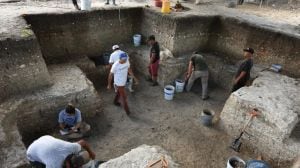US slammed for "biological assault"
WASHINGTON, May 7: The United States has acknowledged that a government crop duster plane had flown over Cuba but denied it had used biol...

WASHINGTON, May 7: The United States has acknowledged that a government crop duster plane had flown over Cuba but denied it had used “biological aggression” against the Communist-ruled island, as Havana has charged. “The United States categorically denies the outrageous charges made by the Cuban government regarding the alleged discharge of the thrips palmi’ insect over Cuba to damage agriculture there,” John Dinger, a State Department spokesman, said yesterday.
He said the United States “has not engaged in any act” in violation of the 1972 convention outlawing biological weapons and called Cuba’s allegations “deliberate disinformation.”
Cuba accused the United States of “biological aggression,” saying a plague of plant-destroying insects first appeared in the west of the country after a US crop-dusting plane sprayed unknown substances during a flight over the region.
In a note to UN Secretary-General Kofi Annan published on Monday, Cuba identified the pest as thrips palmi’, which it said “strikes and severely damages practically every crop, and is also resistant to a considerable variety of pesticides.”
For this reason the insects, which had spread widely in western Cuba, “can be considered ideal biological agents able to inflict heavy damage on agricultural food crops.”
Cuba said the first signs of a thrips plague’ appeared in potato plantations on the Lenin State Horticultural Farm in Matanzas province on December 18 last year.
Based on reproductive cycles of the insect, Cuba said the beginning of the infection can be traced back to the precise time when the US aircraft overflew the island.
“There is reliable evidence that Cuba has once again been the target of biological aggression,” the Cuban note said. During the early 1980’s, Cuba accused the United States of triggering an outbreak of dengue fever on the island.
Dinger said the pilot of the State Department plane observed the Cuban Airlines plane flying below him and alerted the aircraft to his presence by triggering his smoke generator, consistent with normal safety procedures. He said the plane was en route from Florida to Colombia via the Grand Caymen islands. The aircraft had Cuban permission to overfly the island.
Cuba said the alleged US action may have been a violation of a 1972 anti-Biological warfare convention but Dinger said there was no such infringement.
He said the United States unilaterally destroyed all stockpiled biological agents before the convention took effect.
US officials said the credibility of the Cuban claim is undermined by the fact that the thrips palmi insect struck Haiti, Jamaica and other Caribbean islands before infesting Cuba.






- 01
- 02
- 03
- 04
- 05

























